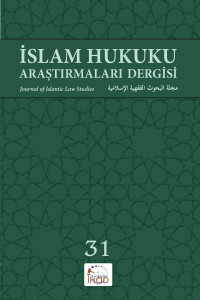Öz
İslâmın geldiği dönemin özel şartları içerisinde nazil olan ayetler ve Hz. Peygamber’in hadislerinin farklı yorumlara tabi tutulması, müslümanların gayrımüslimlerle ilişkilerinin esası konusunda farklı görüşlerin ortaya çıkmasına sebep olmuştur. Bazı fakihler cihadla ilgili ayet ve hadislerin bağlamlarını ve Kur’an bütünlüğünü gözardı ederek gayrımüslimlerle ilişkilerin savaş temeline dayandığı ve onlarla sırf küfür ehli olmaları sebebiyle savaşmanın farz olduğu görüşünü benimsemişlerdir. İmam Muhammed ile İmam Şâfiî bu görüştedir. Bunlara göre gayrımüslimlerin hertürlü barış teklifinin reddedilmesi ve müslüman oluncaya yahut cizye verinceye kadar onlarla savaşılması farzdır. Selef imamları ile hanefî, mâlikî ve hanbelîlerin oluşturduğu çoğunluk hukukçulara göre ise gayrımüslimler tarafından müslümanlara savaş açılmadığı müddetçe onlarla savaşmak farz değildir. Ancak onlar tarafından bir saldırı olursa o zaman savaşmak vacip olur. Kur’an ve Sünnet nasları bir bütün olarak değerlendirildiğinde isabetli olan görüşün bu olduğu anlaşılmaktadır.
Anahtar Kelimeler
Öz
The subjection to the different interpretations of verses which are revealed in special conditions of the period when Islam came and the hadiths of Prophet, has led to the emergence of different opinions about the nature of muslims’ relations with non-muslims. Some jurists, by ignoring the contexts of verses related to jihad and the integrity of Qur’an, have adopted the view that the relations with non-muslims are based on the basis of war and they are supposed to fight only because they are unbelievers. Imam Muhammed and Imam Shafiî had this idea. According to them, it is obligatory to reject all kinds of their offer of peace and to fight with them until being Muslims or giving jizya to muslims. According to the majority of the Salafic imams and hanafi, maliki and hanbalis, it is not obligatory to fight against them unless the war is initiated against muslims by non-muslims. However, if there is an attack by them then fighting becomes wajip. When the texts of the Qur’an and Sunnah are evaluated as a whole, it is understood that this is the accurate view.
Anahtar Kelimeler
Ayrıntılar
| Birincil Dil | Türkçe |
|---|---|
| Konular | Din, Toplum ve Kültür Araştırmaları |
| Bölüm | Araştırma Makaleleri |
| Yazarlar | |
| Yayımlanma Tarihi | 30 Nisan 2018 |
| Gönderilme Tarihi | 1 Ekim 2017 |
| Yayımlandığı Sayı | Yıl 2018 Sayı: 31 |



